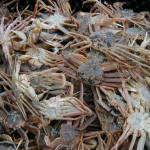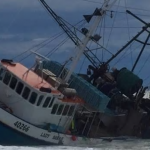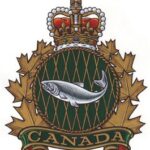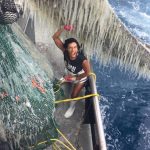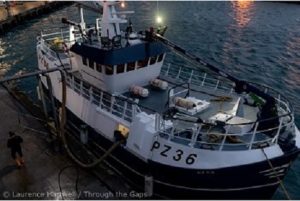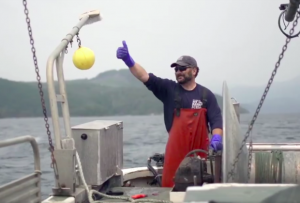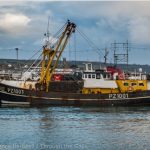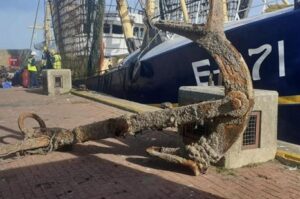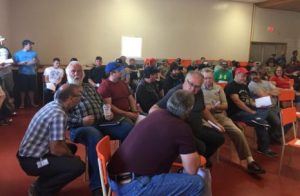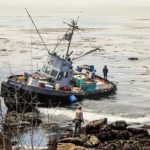Daily Archives: February 10, 2017
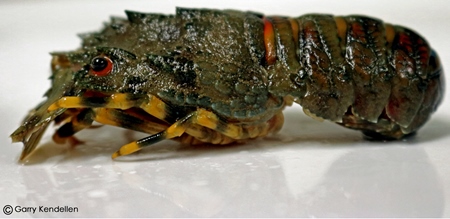
Skipper knew he came across something special when he landed this rare and exotic Slipper Lobster
The extremely rare Slipper Lobster was found recently off Ros a Mhil near the Aran Islands and is now being cared for by Galway Atlantaquaria. This is the first recorded landing of this species this far into the Atlantic north. Slipper Lobsters are bottom dwelling creatures usually found throughout the Mediterranean. Over the last decade there has been a couple of reports of the species being caught off Kerry and a pregnant Slipper lobster was landed off Cork in 2007. Skipper John Connolly of the ‘Connacht Ranger’ from Kilronan on Inis Mor, and landed this exotic catch off Ros a Mhil. The Skipper knew he had landed something rare and so he contacted the Marine Institute to report his find. Read the story here 14:44
Northumberland Fishermen’s Association wants carapace size increase
 For over two years, the local Northumberland Fishermen’s Association has been wanting an increase in lobster carapace size from the Minister of Fisheries and for two years they’ve waited for an answer. “They’re dragging their feet,” says Northumberland’s Fishermen’s Association President Ron Heighton. In early 2015, the association met with Fisheries and Oceans and other fishing organizations to discuss and agree to potential changes to the lobster industry in order to increase the carapace lobster size within a two-year window. At that time, after a ballot vote was distributed among all the lobster fishers in lobster fishing area 26A in Nova Scotia with the majority voting for an increase in carapace size. The carapace is the part of the body between the lobster’s eyes and its tail. Fishermen who catch undersized lobster have to throw them back. Two years later, there has been no decision reached by Fisheries and Oceans about implementing a size increase for the upcoming lobster season, Heighton said. Read the story here 14:23
For over two years, the local Northumberland Fishermen’s Association has been wanting an increase in lobster carapace size from the Minister of Fisheries and for two years they’ve waited for an answer. “They’re dragging their feet,” says Northumberland’s Fishermen’s Association President Ron Heighton. In early 2015, the association met with Fisheries and Oceans and other fishing organizations to discuss and agree to potential changes to the lobster industry in order to increase the carapace lobster size within a two-year window. At that time, after a ballot vote was distributed among all the lobster fishers in lobster fishing area 26A in Nova Scotia with the majority voting for an increase in carapace size. The carapace is the part of the body between the lobster’s eyes and its tail. Fishermen who catch undersized lobster have to throw them back. Two years later, there has been no decision reached by Fisheries and Oceans about implementing a size increase for the upcoming lobster season, Heighton said. Read the story here 14:23
Don Young hits term limit for House subcommittee chairmanship
 Alaska’s sole congressman, Don Young, will not chair any committees or subcommittees during this term of Congress, having reached term limits in all of his prior positions. Young will retain some leadership positions and remains the longest-serving Republican in the House. Since 1994, Republicans in the House and Senate have imposed six-year term limits on committee leadership. Instead, this year Young was named “chairman emeritus” of the Committee on Natural Resources. The position allows him to sit on all five subcommittees, which oversee federal lands and the resources located on them, oceans, Native affairs and related investigations. Read the story here 13:05
Alaska’s sole congressman, Don Young, will not chair any committees or subcommittees during this term of Congress, having reached term limits in all of his prior positions. Young will retain some leadership positions and remains the longest-serving Republican in the House. Since 1994, Republicans in the House and Senate have imposed six-year term limits on committee leadership. Instead, this year Young was named “chairman emeritus” of the Committee on Natural Resources. The position allows him to sit on all five subcommittees, which oversee federal lands and the resources located on them, oceans, Native affairs and related investigations. Read the story here 13:05
Southeast’s first crab fisheries of the year set to open
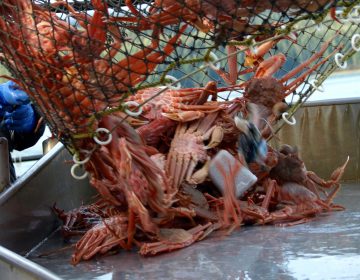 Alaska has dozens of crab species—about seven that are commercial harvested. So what’s Tanner crab like? To help answer that question, I asked Joe Stratman, the lead crab biologist for the Alaska Department of Fish and Game in Southeast. He says Tanners are related to the popular snow crab. “What I always liken it to is when they’re at the buffet line in Los Vegas they often see snow crab which is a kind of Chionoecetes opilio. Our Tanner crab in Southeast looks very similar to that. It’s a little larger,” Stratman said. Recent markets seem to like Tanner crab too. Last year’s harvest in Southeast was valued at nearly $3 million dollars. 74 permit holders participated in the fishery. They brought in a total of just over 1.3 million pounds. The price per pound averaged $2.23 which is thirty cents higher than the year before. Read the story here 11:54
Alaska has dozens of crab species—about seven that are commercial harvested. So what’s Tanner crab like? To help answer that question, I asked Joe Stratman, the lead crab biologist for the Alaska Department of Fish and Game in Southeast. He says Tanners are related to the popular snow crab. “What I always liken it to is when they’re at the buffet line in Los Vegas they often see snow crab which is a kind of Chionoecetes opilio. Our Tanner crab in Southeast looks very similar to that. It’s a little larger,” Stratman said. Recent markets seem to like Tanner crab too. Last year’s harvest in Southeast was valued at nearly $3 million dollars. 74 permit holders participated in the fishery. They brought in a total of just over 1.3 million pounds. The price per pound averaged $2.23 which is thirty cents higher than the year before. Read the story here 11:54
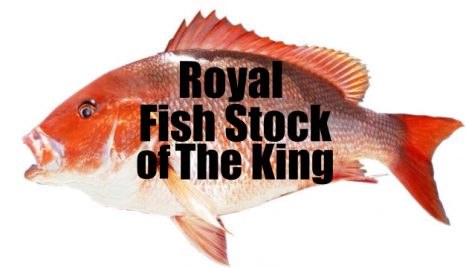
Hooked Up!!! Sea lords and the secret votes that made them rich
The votes helped create the system that now allows 50 businesses and fishermen to control 81 percent of the nation’s commercial red snapper allocation. Those fishermen can make a total of $23 million every year. And the government gets nothing in return from the fishermen. “This is a public asset,” Congressman Garret Graves says. “You and I own this. The public owns this. You know, people always talk about [how] government needs to run like a business. Could you ever imagine a business saying, ‘Oh, here’s our inventory, and it’s free! You come in a grocery store, you take whatever you want.’ The vote predates Graves’ term in Washington. But last decade, Congress helped orchestrate it. The feds wanted to start what’s called an IFQ program, short for “individual fishing quota”. Fishermen would get an allocation to fish the entire year. Congress required three votes – first by a little-known public body called the Gulf of Mexico Fisheries Management Council, an 11-member body that’s primarily appointed by the five Gulf states. After the Gulf Council vote, Congress also required two votes by the commercial fishermen who already were permitted to fish for red snapper in the Gulf. And those are the votes that the federal government won’t let us see. Video, read the story here 11:09
Massachusetts fisheries officials: Loophole in striped bass fishery needs closing
 Massachusetts fisheries officials want to to close a loophole in state regulations that resulted in what they believe were illegal landings of striped bass last year. At a public hearing at Massachusetts Maritime Academy Wednesday night, Division of Marine Fisheries Deputy Director Dan McKiernan said the state is looking to reduce the number of striped bass that commercial fishermen could land from 15 down to two, if they’re fishing from shore. “What happened last year was disgusting,” said Patrick Paquette of the Massachusetts Striped Bass Association, which is composed of both commercial and recreational fishermen. “There was a rampant black market at the (Cape Cod) canal. Plenty of guys were taking fish from friends, putting them in coolers, and selling them under their boat permit.” Under state striped bass fishing regulations, a commercial fisherman can buy a boat permit that allows him or her to catch and sell up to 15 fish a day. There is also a less expensive individual permit under which he or she can land two fish a day from shore. The state limited commercial fishing to two days a week. In bad weather, some fishermen with boat permits fished from shore, and could technically land their 15 fish. Read the story here 09:37
Massachusetts fisheries officials want to to close a loophole in state regulations that resulted in what they believe were illegal landings of striped bass last year. At a public hearing at Massachusetts Maritime Academy Wednesday night, Division of Marine Fisheries Deputy Director Dan McKiernan said the state is looking to reduce the number of striped bass that commercial fishermen could land from 15 down to two, if they’re fishing from shore. “What happened last year was disgusting,” said Patrick Paquette of the Massachusetts Striped Bass Association, which is composed of both commercial and recreational fishermen. “There was a rampant black market at the (Cape Cod) canal. Plenty of guys were taking fish from friends, putting them in coolers, and selling them under their boat permit.” Under state striped bass fishing regulations, a commercial fisherman can buy a boat permit that allows him or her to catch and sell up to 15 fish a day. There is also a less expensive individual permit under which he or she can land two fish a day from shore. The state limited commercial fishing to two days a week. In bad weather, some fishermen with boat permits fished from shore, and could technically land their 15 fish. Read the story here 09:37
The perils of approving a marine sanctuary
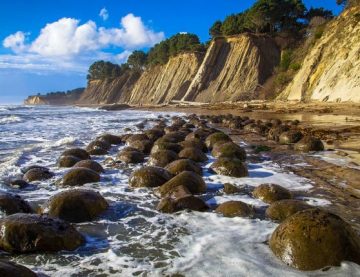 The word sanctuary has a nice sound. A holy place or natural retreat for animals. Add marine. Marine sanctuary. A safe place for Dory. Add Native Americans. It’s a trifecta: Chumash Heritage National Marine Sanctuary. Sounds so beautiful. Or is it? Our San Luis Obispo County Board of Supervisors has had two hearings on this subject in recent weeks. Other cities and agencies have also been hearing this proposal. But, the Board of Supervisors voted 3-2 against the establishment of a sanctuary off our coast. How can this be? Proponents for the sanctuary delivered 12,000 signatures on petitions to demonstrate local support. On the other side, the opponents appeared to have fewer than 400 supporters. On one hand, thousands of local citizen have faced off against the small business community as represented by commercial fishermen, ranchers, farmers and the Chamber of Commerce. An analogy may be that this is a case of popular vote versus the Electoral College as we saw in the recent presidential election. Another wrinkle is the name of the sanctuary. Although “Chumash” is used in the title, the only state and federally recognized Chumash Tribe, the Santa Ynez Band of Chumash Indians has not endorsed the sanctuary bearing their name. Another state recognized tribe, The Salinan Tribe, has not endorsed the sanctuary either. What’s going on? Great read! Read the story here 08:56
The word sanctuary has a nice sound. A holy place or natural retreat for animals. Add marine. Marine sanctuary. A safe place for Dory. Add Native Americans. It’s a trifecta: Chumash Heritage National Marine Sanctuary. Sounds so beautiful. Or is it? Our San Luis Obispo County Board of Supervisors has had two hearings on this subject in recent weeks. Other cities and agencies have also been hearing this proposal. But, the Board of Supervisors voted 3-2 against the establishment of a sanctuary off our coast. How can this be? Proponents for the sanctuary delivered 12,000 signatures on petitions to demonstrate local support. On the other side, the opponents appeared to have fewer than 400 supporters. On one hand, thousands of local citizen have faced off against the small business community as represented by commercial fishermen, ranchers, farmers and the Chamber of Commerce. An analogy may be that this is a case of popular vote versus the Electoral College as we saw in the recent presidential election. Another wrinkle is the name of the sanctuary. Although “Chumash” is used in the title, the only state and federally recognized Chumash Tribe, the Santa Ynez Band of Chumash Indians has not endorsed the sanctuary bearing their name. Another state recognized tribe, The Salinan Tribe, has not endorsed the sanctuary either. What’s going on? Great read! Read the story here 08:56
Open Letter to George Soros, Help Us Kill Industrial Fishing
 Dear Mr. Soros: The Global High Seas Marine Preserve, when established, will effectively ban industrial and commercial fishing in international waters and thus allow stocks of major marine predators and other species to return in numbers sufficient to permit “some” fishing. My name is Danny Quintana and I conceived of the idea of the GHSMP when writing my latest book, Space & Ocean Exploration: The Alternative to the Military-Industrial Complex. During research for the book I realized how dire the situation of ocean wildlife had become in the last 50 years during a technological boom in the fishing industry and the sushi craze which is still in full swing throughout much of the world. Read the rest here (if you can stand it!) 08:30
Dear Mr. Soros: The Global High Seas Marine Preserve, when established, will effectively ban industrial and commercial fishing in international waters and thus allow stocks of major marine predators and other species to return in numbers sufficient to permit “some” fishing. My name is Danny Quintana and I conceived of the idea of the GHSMP when writing my latest book, Space & Ocean Exploration: The Alternative to the Military-Industrial Complex. During research for the book I realized how dire the situation of ocean wildlife had become in the last 50 years during a technological boom in the fishing industry and the sushi craze which is still in full swing throughout much of the world. Read the rest here (if you can stand it!) 08:30
Fishing Industry Fights N.Y. Offshore Wind Area In Court
 Lawyers representing a host of fishing communities, associations and businesses – led by scallop industry trade group the Fisheries Survival Fund – argued in U.S. District Court in Washington, D.C., yesterday against an offshore wind lease sale off the coast of Long Island, N.Y. A ruling is expected in the coming days, according to a press release from the Fisheries Survival Fund. The plaintiffs are seeking a preliminary injunction against the wind farm lease that the U.S. Bureau of Ocean Energy Management (BOEM) preliminarily awarded to Statoil for $42.5 million at an auction in December. They argued that the site of the project is in the middle of important fishing grounds, particularly for the scallop and squid fisheries. They also claimed that allowing the “unlawful” lease sale to go through would cause “irreparable harm to commercial fishermen.” Read the story here 07:31
Lawyers representing a host of fishing communities, associations and businesses – led by scallop industry trade group the Fisheries Survival Fund – argued in U.S. District Court in Washington, D.C., yesterday against an offshore wind lease sale off the coast of Long Island, N.Y. A ruling is expected in the coming days, according to a press release from the Fisheries Survival Fund. The plaintiffs are seeking a preliminary injunction against the wind farm lease that the U.S. Bureau of Ocean Energy Management (BOEM) preliminarily awarded to Statoil for $42.5 million at an auction in December. They argued that the site of the project is in the middle of important fishing grounds, particularly for the scallop and squid fisheries. They also claimed that allowing the “unlawful” lease sale to go through would cause “irreparable harm to commercial fishermen.” Read the story here 07:31


































